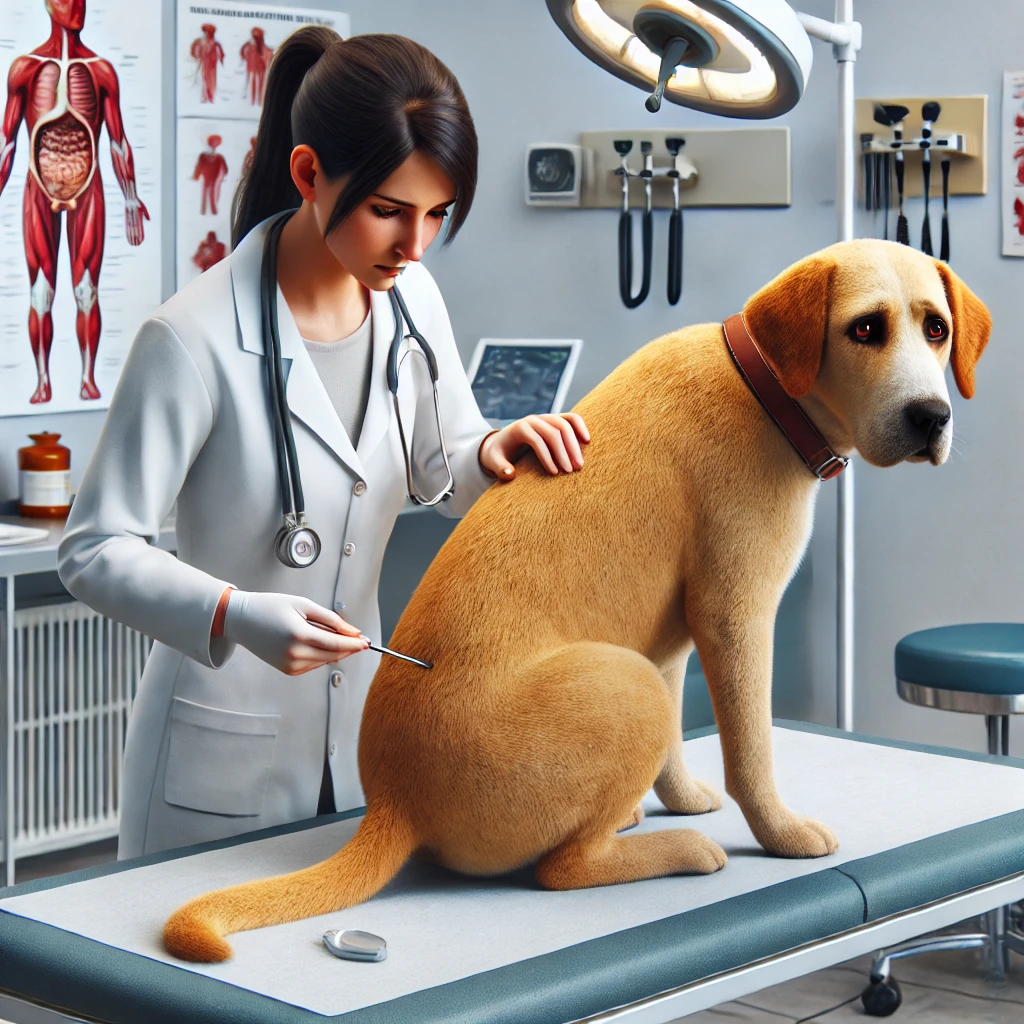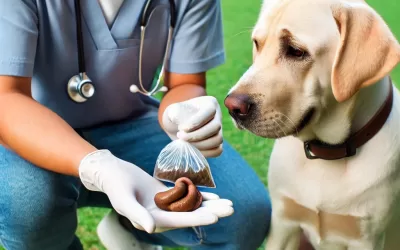Understanding Blood in Dog Urine:
Causes, Home Remedies, and When to Seek Help
Finding blood in your dog’s urine can be downright terrifying. I mean, who knew those adorable puppy eyes could hide such drama, right? But don’t panic! We’ve got the scoop on what might be going on, some home remedies to try, and when it’s time to put on your superhero cape and rush to the vet. Let’s dive in!
What Causes Blood in a Dog’s Urine?

Blood in a dog’s urine, known as hematuria, can be caused by a range of things, from the mildly annoying to the “yikes, get to the vet!” Here are some usual suspects:
Urinary Tract Infections (UTIs)
Ah, the good old UTI – even our furry pals aren’t safe from these pesky infections. Bacteria can sneak into the urinary tract, causing inflammation and bleeding. If your dog is peeing like it’s going out of style or you catch a whiff of something funky, a UTI might be the culprit.
Bladder Stones
Bladder stones are like those uninvited guests who show up, make a mess, and leave you wondering what went wrong. These pesky stones can irritate the bladder or urethra, leading to blood in the urine. Ouch!
Trauma
Dogs live life with zest and sometimes that means they get into a bit of trouble. Injuries from accidents, fights, or even overly enthusiastic play can cause blood to appear in their urine. Think of it as your dog’s way of saying, “I might’ve overdone it.”
Tumors
Nobody likes to think about tumors, but they can happen. Both benign and malignant tumors in the bladder or urinary tract can cause bleeding. Remember, early detection is key.
Prostate Issues (in Male Dogs)
For the gentlemen in the canine world, an enlarged prostate or prostate infection can lead to bloody urine. It’s like the dog version of “mid-life crisis” symptoms.
Kidney Disease
Kidney infections or diseases can also cause hematuria. Kidneys are essential, so if they’re acting up, it’s serious business.
Infections and Inflammation
General infections or inflammation in the urinary tract can result in bloody urine. Sometimes, it’s just that simple.
Identifying Black Specks in Urine

Ever noticed black specks in your dog’s urine? Here’s the lowdown:
- Bladder Stones or Crystals: These little troublemakers can break apart and show up as black specks.
- Blood Clots: Sometimes, the blood in the urine clots and appears as black specks. It’s gross, but it happens.
Home Remedies for Blood in Dog Urine
Before you break out the doggie doctor kit, here are some home remedies that might help manage mild cases of hematuria:
Increase Water Intake
Hydration station! Make sure your dog drinks plenty of water. It helps flush out the system and reduces the concentration of blood in the urine.
Cranberry Supplements
Cranberry isn’t just for Thanksgiving. Supplements can help acidify the urine and prevent bacterial growth. Your dog will thank you (probably with a tail wag).
Probiotics
Probiotics are the unsung heroes of gut health. They promote a healthy balance of bacteria in the gut and urinary tract, potentially preventing infections.
Dietary Changes
Sometimes, it’s all about what’s in the bowl. A special diet prescribed by your vet can help manage and prevent bladder stones or urinary issues. For more detailed dietary advice and recipes tailored for your dog’s health, check out my book, “The A-to-Z Cookbook for Healthy Homemade Dog Food: 101 Quick & Easy DIY Dog Meals.” It’s packed with delicious, recipes that will make your dog’s tail wag with delight while keeping their urinary health in check. Trust me, your pooch will thank you!
When to See a Vet

While home remedies can work wonders, there are times when you need to get your fur baby to the vet pronto:
- Persistent or Worsening Symptoms: If the blood in the urine sticks around or gets worse, it’s vet time.
- Signs of Pain or Discomfort: If your dog is yelping, whining, or having trouble peeing, don’t wait.
- Old Dogs: Older dogs are more prone to serious conditions like tumors or kidney disease, so a prompt vet visit is a must.
- Other Symptoms: Vomiting, lethargy, or loss of appetite along with hematuria means it’s definitely time to see the vet.
Wrapping It Up: Taking Care of Your Furry Friend

Finding blood in your dog’s urine is a shocker, no doubt about it. However, knowing the potential causes and how to react can make a big difference. From UTIs to bladder stones, understanding what’s going on is half the battle. Always consider professional veterinary advice for persistent or severe cases, and use home remedies to support your dog’s health in the meantime.
For more information on dog health and tips, check out these helpful resources:
Thank You For Checking out our Blog Post:
Understanding Blood in Dog Urine:
Causes, Home Remedies, and When to Seek Help
Links

People Also Ask
Q: Why is my dog peeing blood?
A:Blood in your dog’s urine, also known as hematuria, can be caused by various conditions. Common reasons include urinary tract infections, bladder stones, kidney disease, trauma, or even certain types of cancer. If you notice blood in your dog’s urine, it’s essential to consult a veterinarian to determine the underlying cause and receive appropriate treatment.
Q: What does a blood clot in urine look like?
A: A blood clot in urine can appear as small, dark red to brownish pieces. It might look like tiny jelly-like clumps floating in the urine. The presence of blood clots often indicates a more serious issue within the urinary tract, such as significant bleeding from the bladder or kidneys, and should be promptly evaluated by a veterinarian.
Q: Can blood in urine go away on its own?
A: In some cases, minor causes of blood in the urine, such as a mild urinary tract infection, may resolve with proper hydration and rest. However, it’s crucial not to ignore the symptom. Persistent or recurrent hematuria usually indicates an underlying problem that requires medical attention. Always consult a veterinarian to ensure your pet receives the correct diagnosis and treatment.
Q: What is hematuria in dogs?
A: Hematuria is the medical term for the presence of blood in the urine. In dogs, it can be a symptom of various health issues, ranging from infections and stones to more severe conditions like tumors or trauma. Identifying the cause of hematuria involves a thorough examination and diagnostic tests conducted by a veterinarian. Early detection and treatment are vital for your dog’s health.











0 Comments